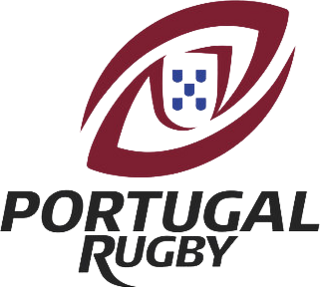The Czechoslovakia national rugby union team (sevens) represented Czechoslovakia at sevens rugby.
The Czechoslovakia national rugby union team (sevens) represented Czechoslovakia at sevens rugby.
Czechoslovakia participated in the qualifying tournament for the 1993 Rugby World Cup Sevens at Catania, Sicily in what was probably their last outing before the breakup of the country. They only won one of their five matches but made it to the quarterfinals, beating Tunisia.

Rugby union football, commonly known simply as rugby union or more often just rugby, is a close-contact team sport that originated at Rugby School in England in the first half of the 19th century. Rugby is based on running with the ball in hand. In its most common form, a game is played between two teams of 15 players each, using an oval-shaped ball on a rectangular field called a pitch. The field has H-shaped goalposts at both ends.

The SVNS, known as the HSBC SVNS for sponsorship reasons, is an annual series of international rugby sevens tournaments run by World Rugby featuring national sevens teams. Organised for the first time in the 1999–2000 season as the IRB World Sevens Series, the competition was formed to promote an elite-level of international rugby sevens and develop the game into a viable commercial product. The competition has been sponsored by banking group HSBC since 2014.

Rugby sevens is a variant of rugby union in which teams are made up of seven players playing seven-minute halves, instead of the usual 15 players playing 40-minute halves. Rugby sevens is administered by World Rugby, the body responsible for rugby union worldwide. The game is popular at all levels, with amateur and club tournaments generally held in the summer months. Sevens is one of the most well distributed forms of rugby, and is popular in parts of Africa, Asia, Europe, and the Americas, and especially in the South Pacific.

Rugby World Cup Sevens (RWCS) is the quadrennial world championship of rugby sevens, a variant of rugby union. Organised by World Rugby, it currently consists of men's and women's tournaments, and is the highest level of competition in the sport outside of the Summer Olympics.

The French Rugby Federation is the governing body for rugby union in France. It is responsible for the French national team and the Ligue nationale de rugby that administers the country's professional leagues.

Stade Jules Deschaseaux is a multi-purpose stadium in Le Havre, France. It is used mostly for football matches. The stadium is able to hold 16,400 people and was built in 1932.

The Netherlands national rugby union team represents Netherlands in men's international rugby union competitions. Nicknamed The Oranges (Oranje), is considered one of the stronger tier 3 teams in European rugby and currently compete in the second division of the Rugby Europe International Championships in the Rugby Europe Trophy, a competition which is just below the Rugby Europe Championship where the top 6 countries in Europe compete. They are yet to participate in any Rugby World Cup.

The Portugal national rugby union team, nicknamed Os Lobos, represents Portugal in men's international rugby union competitions. The team, as well as all rugby union in Portugal, is administered by the Federação Portuguesa de Rugby.
The Czech Rugby Union is the governing body for rugby union in the Czech Republic. It was founded in 1926 and became affiliated to the International Rugby Board in 1988 while still the governing body for Czechoslovakia. It organises the two leagues, the Extraliga ragby XV and 1. Liga ragby XV, and the various national teams. It is based in Prague.

The Poland national rugby union team represents Poland in men's international rugby union competitions. Nicknamed The White and Reds (Biało-czerwoni), is considered one of the stronger tier 3 teams in European rugby and currently compete in the second division of the Rugby Europe International Championships in the Rugby Europe Trophy, a competition which is just below the Rugby Europe Championship where the top 6 countries in Europe compete. They are yet to participate in any Rugby World Cup and often play in white with red shorts as well as in red with white shorts.
Rugby union in Bulgaria is a minor but growing sport. Bulgaria is ranked 90th worldwide by the International Rugby Board (IRB) as of 8 October 2007. There are 3,026 Bulgarian rugby players.

The Slovakia national rugby union team has yet to qualify for a Rugby World Cup. They are currently affiliated to FIRA-AER, but not yet to World Rugby.
The Czechoslovakia national rugby union team was the national rugby team of Czechoslovakia, before the country was split into the Czech Republic and Slovakia. They participated in qualifiers for the 1991 Rugby World Cup, but did not qualify.

Rugby union in the Czech Republic is a growing sport. As of 1 November 2010, they are currently ranked thirty-first in the International Rugby Board's world rankings,.

Rugby union in Poland is a moderately popular sport and currently, the Polish men`s national team are ranked 30th in the world as of 20th November 2022. The Poland women's rugby sevens team won the silver medal at the 2023 European Games behind Great Britain, progressing to the final 2024 Summer Olympic qualification tournament.

Rugby union in Slovakia is a minor but growing sport.

Rugby union in Czechoslovakia was a moderately popular sport. It was most popular in Moravia, Prague and Bratislava

Rugby sevens was played at the Olympics for the first time at the 2016 Summer Olympics, with both men's and women's contests. It was added to the Olympics following the decision of the 121st IOC Session in Copenhagen in October 2009. The champions for the inaugural rugby sevens tournament in 2016 were Fiji for the men and Australia for the women. Prior to 2016, 15-a-side matches were played in 1900, 1908, 1920, and 1924.
Polish Rugby Union, abbreviated to PZR, is the only legal Polish representative of Polish rugby union and rugby sevens for both men and women's rugby and all age groups.